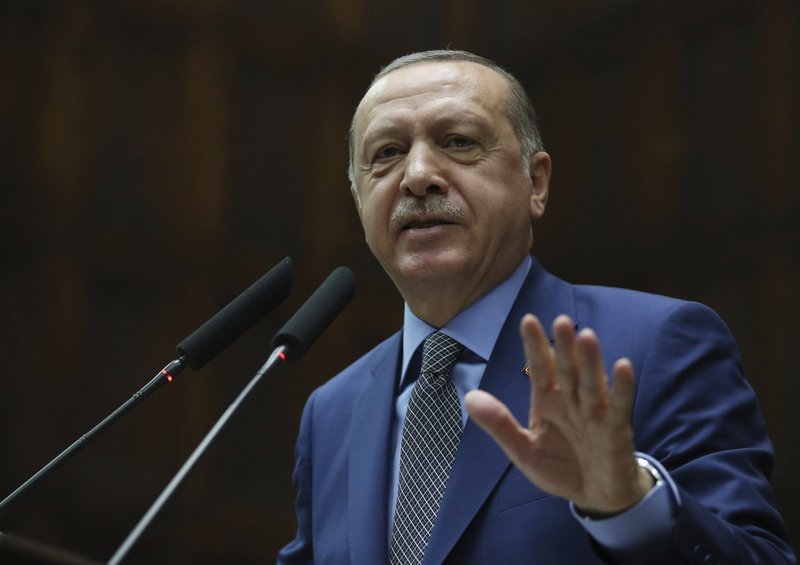ISTANBUL -- Turkey's president says U.S. President Donald Trump has promised to look into possible U.S. measures against a Turkish bank for evading sanctions on Iran.
Speaking Saturday, Turkish President Recep Tayyip Erdogan gave details about a phone conversation he had Thursday with Trump as relations between the two countries ease after Turkey's release of an American pastor.
Erdogan said he raised the issue of the state-owned Halkbank, which had an executive charged in New York over allegations of taking part in a scheme to evade U.S. sanctions on Iran. Turkey maintains Halkbank did not violate the sanctions.
Erdogan said Trump "said he would immediately instruct his ministers about this." It was not clear what Trump could do.
They also discussed joint military patrols in Manbij in northern Syria.
Erdogan said he will meet with Trump in France next weekend.
On Friday, Turkey and the U.S. lifted sanctions on senior government officials that had been imposed during the diplomatic standoff over the arrest of American pastor Andrew Brunson, officially ending a case that had strained relations between the two NATO members.
The Treasury Department said it was lifting the sanctions on Turkish Minister of Justice Abdulhamit Gul and Minister of Interior Suleyman Soylu, while Turkey removed its retaliatory measures against Attorney General Jeff Sessions and Homeland Security Secretary Kirstjen Nielsen.
The moves follow the release last month of Brunson, who spent two years in prison and faced the possibility of a life sentence on terrorism charges that he called "ridiculous."
Brunson had lived in Turkey as a missionary for more than two decades when he was arrested as part of a widespread Turkish government crackdown that followed a failed coup against Erdogan in July 2016.
Brunson denied the charges against him, and the U.S. repeatedly called for his release.
In August, it imposed sanctions on the two government officials to press Turkey to release the 50-year-old evangelical pastor.
Brunson was convicted in October on charges of providing assistance to terrorist groups and sentenced to three years in prison. He was later freed and allowed to leave the country. He is now back in the United States.
PRESSURING SAUDIS
Separately, Erdogan lashed out on Friday at Saudi Arabia over the killing of Saudi dissident Jamal Khashoggi, and turned up pressure on the kingdom by invoking the NATO alliance as a means to ensure the perpetrators will be punished.
Erdogan, in an opinion piece published by The Washington Post, reiterated his assertion that the order to kill Khashoggi in the Saudi Consulate in Istanbul came from "the highest levels of the Saudi government."
At the same time, however, he said he did not believe Saudi King Salman ordered it. That seemed to suggest that he blames Crown Prince Mohammed bin Salman, the kingdom's unofficial ruler.
"No one should dare to commit such acts on the soil of a NATO ally again," Erdogan wrote in the Post, which had published columns by Khashoggi. "The Khashoggi murder was a clear violation and a blatant abuse of the Vienna Convention on Consular Relations. Failure to punish the perpetrators could set a very dangerous precedent."
Turkish officials have leaked a stream of details about the killing of Khashoggi at the consulate on Oct. 2. He had gone there to obtain documents that would have allowed him to marry his Turkish fiancee.
The Saudi government, after initially denying Khashoggi was killed inside the consulate, later changed its story several times before acknowledging that a team of agents had traveled from Saudi Arabia and killed him. It said it had arrested 18 people in connection with the killing.
But officials have not said where Khashoggi's body is or who ordered the killing.
Prince Mohammed appears to have retained his tight grip on power in Saudi Arabia, despite a growing international consensus that he was behind the killing. The Trump administration has decided to stand by him, according to people familiar with the White House deliberations.
Erdogan, however, has shown that he has no intention of letting the issue disappear. Khashoggi was a friend of the president and many of his close advisers, and Erdogan has taken his killing as a personal affront.
"Some seem to hope this 'problem' will go away in time," he wrote. "But we will keep asking those questions, which are crucial to the criminal investigation in Turkey, but also to Khashoggi's family and loved ones," he added.
"At the very least, he deserves a proper burial in line with Islamic customs."
Erdogan also harshly criticized the actions of the Saudi consul general and what he described as a lack of cooperation by Saudi investigators.
"Though Riyadh has detained 18 suspects, it is deeply concerning that no action has been taken against the Saudi consul general, who lied through his teeth to the media and fled Turkey shortly afterward," Erdogan wrote.
"Likewise, the refusal of the Saudi public prosecutor -- who recently visited his counterpart in Istanbul -- to cooperate with the investigation and answer even simple questions is very frustrating," he added.
"His invitation for Turkish investigators to Saudi Arabia for more talks about the case felt like a desperate and deliberate stalling tactic."
Erdogan signaled he intended to keep up the pressure.
"Had this atrocity taken place in the United States or elsewhere, authorities in those countries would have gotten to the bottom of what happened. It would be out of the question for us to act any other way."
Information for this article was contributed by staff members of The Associated Press and by Carlotta Gall of The New York Times.
A Section on 11/04/2018
